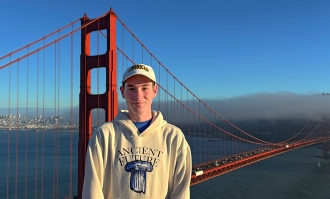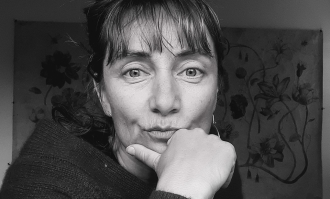- News
- News Archive
- Imagine - An MFA Student’s Story of Beating the Odds
Imagine - An MFA Student’s Story of Beating the Odds
By Max Bidasha
![]() Subscribe to RSS Feed
Subscribe to RSS Feed

Imagine having everything you ever wanted: A home in picturesque Napa, a lucrative career, attending one of the best schools in the San Francisco Bay Area, a budding relationship with all of the fluttering and clumsy butterflies. Now imagine getting a call that would change your life forever. After a lump in your left hand began to grow, you go to the doctor. Maybe it’s just scar tissue from the two previous carpal tunnel surgeries you had. The same doctor who performed your second carpal tunnel surgery walks in, rolls his eyes, and without even looking at your hand barks, “I already told you there is nothing else we can do!” You feel devastated, angry, and like a complete inconvenience for simply existing and needing help. After you show the doctor your hand, his mouth drops to the floor. The doctor says, “Oh, this isn’t good.” Your heart races. You go into what you think is your third carpal tunnel surgery. The healing process feels the same as before, until you get a call from your hand surgeon. They tell you that at thirty-five, you have an extremely rare form of cancer that only 60 people get in the entire country each year. “You have stage four cancer” resounds and your mind begins to think the absolute worst-case scenario will happen, and your greatest fears are set when your calloused oncologist says, “There is a 50/50 chance chemo will even work, and if it does work, you’ll have a year or two to live.” He tells you this without flinching or changing his voice that could have shown some emotion, hope, or humanity. You leave the hospital knowing you have to share the news with friends and family, but you’re still trying to wrap your head around everything. You begin to think of all the things you still want to do, but don’t know if you’ll get to do any of them. You are too shocked to cry. You find yourself comforting others at the idea of your passing. You answer complete strangers’ questions like, “When are you going to die?” Your schedule quickly fills up with appointments. You run from doing blood work to CT scans to biopsies and MRIs. You don’t just do one MRI, but several, because “your cancer doesn’t like to show up unless you have extra contrast.” You vomit from the contrast, while the only medical professional to show you any form of human kindness is the technician who grabs a bucket, pats your back, and calls you “Bud” as you projectile vomit into his blue bucket. You learn that you need an underarm lymph node biopsy. You are held down by four people who could probably win a strong man competition. You feel the needle enter your underarm several times. In fact, you feel everything. After five minutes of terrible pain, your nurse tells you that you are a bleeder. You are informed later that day that you will need a lung biopsy because the cancer has spread to your lungs. You can’t think of anything else you’d rather do less, but you go in. You feel the numbing needles that feel like bee stings, but nothing else. You are told that, “while it is rare, the possibility of your lung collapsing is still there, and you’ll know it if it does.” Your lung collapses two days later. You can’t breathe in all the way. The pain is sharp, overwhelming, and excruciating, but still NOTHING like the pain you’ll experience during the insertion of the chest tube! You aren’t sure if the person putting the chest tube in is a doctor, and you can’t help but notice him reading the directions at the foot of your hospital bed. You inquire if he has ever done “this” before. He waves you off and explains that you are getting the new model and they want to make sure they do it right. You can’t believe your ears. He runs his fingers over your rib cage, finds the spot, and tells you to breathe. He puts all of his body weight on you as he pushes the tube through your body. You scream and see black. You tell him you might faint. He replies, “well, you’re already on a bed.” Your dad calls you pleading for you to move to Sequim, Washington, but you are too independent. Life gives you two whole seconds to breathe and reflect, leaving you looking reality in the face. You know you don’t want to die in Sequim, but you know that you want to spend as much time as you have left on this earth with people who love you. You’ve quit school. Your significant other breaks up with you on Valentine’s Day because they aren’t strong enough to deal with your situation. You meet your new doctors and nurses. Your mind is put at ease when you learn your family doctor, oncologist, and hand surgeon are all women, and you experience something you never felt from doctors in California: compassion. Your personable, intelligent, and kind oncologist explains that the tumor in your hand is spreading the cancer at a rapid rate, and the best plan of action is to amputate it and then start chemo ASAP. You agree because, for you, there’s a lot of living to be done. You thank the stars that you are right-handed. Your surgery is scheduled, and you begin to mentally prepare for parting ways with a body part you never realized you used as much as you did. The surgery date arrives. You are starving because you have to fast from the night before. You get in your car with your family to drive seventy minutes away. You get a call letting you know your surgery needed to be postponed until the next day. You mentally prepare again, and of course, you are hungry! You get a call six times on six different days to reschedule your surgery. You are more than frustrated and hungry. You know that every second you have your hand is another second the cancer is pumping through your blood and spreading. The day finally arrives. It’s early. The nurses are amazing and so is the doctor who rescheduled you six times. They start your IV. You know that when you wake up your body is going to look different. It’s going to feel different. What you weren’t prepared for is how differently people would treat you. You said goodbye to your hand on December 6, 2018, four days before your 36th birthday. Eight days later, you start the most hardcore chemotherapy on the market. It’s neon red and makes you urinate a color you never want to see again. On January 1, 2019 all of your hair falls out. Up to this point, you’ve been strong. You’ve been positive, but now, all you can do is cry. Your eyebrows fall out, along with your eyelashes, and leg hair. You have to smirk when you realize your nose and ear hair are the last to go. You realize that your life HAS to be more than just not dying. You call your school. They let you back in. You catch up. You go to school in California once a month and do the rest online. You graduate cum laude and earn the Dean’s Outstanding Student Award. You go to see several Broadway shows because it might be your last chance to go. You are inspired and realize that YOU have a story to tell. You write your first play called STAGES about your cancer journey that unites people and shows those without cancer how to respectfully treat those with the disease. You direct, act in, and produce your show. You find your calling. You write another play called Missing Red Girls about the 6,000 missing and murdered Indigenous women in the US and Canada alone with a cast of all Native actors. You get accepted to grad school. Missing Red Girls is chosen out of seventy plays for a community reading, and then a festival in Virginia. You get straight A’s in your first summer in your MFA in playwriting program at grad school. You’ve been seeing a nutritionist, minimizing sugar and carb intake. You drink alkaline water, you do Reiki, you take daily walks, appreciate nature, try cannabis for the first time because your oncologist shares that it is shown to shrink cancer cells. You pray every single day. You visit your grandmother’s grave and tell her not to take you quite just yet. You get the results back from your latest CT scan. You and your oncologist can’t believe the news, because “the most they could have hoped for was for the cancer to stop growing.” They can’t see a trace of cancer in your body now! You continue to surround yourself with love, art, nature, music, and theatre. And while NO ONE knows when we are going to die, you know that the Creator has the final say in how long you get to enjoy life…so you enjoy it to your fullest by always having goals and doing your best to see beauty in even the darkest of times. You learn that you don’t have to imagine because everything you need to truly live is inside of you. You enjoy every second in your MFA program at Dominican, publish your first book of poetry called The Pros and Cons of Dying, and continue with all the goals you ever had and create new ones along the way because you are more than alive. YOU ARE LIVING!



